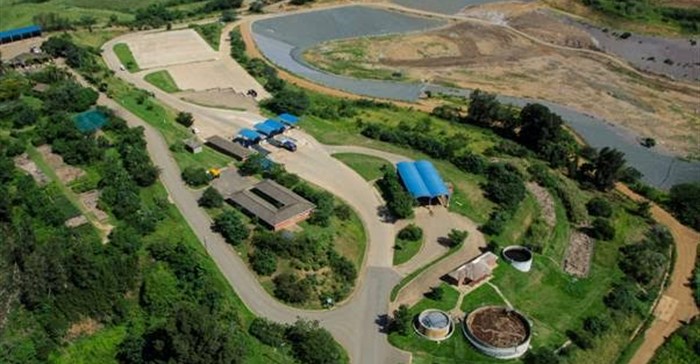According to the 2012 National Waste Information Baseline Report*, South Africa generated approximately 108-million tonnes of waste in 2011; of which 98-million tonnes were disposed of at landfills. The remaining air space at each landfill site in South Africa is fast approaching capacity, and so is the available space to extend landfill sites while complying with stringent waste legislation.

Buffelsdraai Landfill Site
Addressing this and other issues, the KwaZulu-Natal Landfill & Waste Treatment Interest Group (LaWTIG), a subsidiary of the Institute of Waste Management of Southern Africa (IWMSA), will host the biennial seminar on waste treatment and disposal by landfill. The seminar, which will take place for the first time on an operational landfill site, the Buffelsdraai Landfill Site, is set to take place from Wednesday, 18 to Friday, 20 October 2017. It is dedicated to capacity building and sharing valuable knowledge on technology and practices that will ultimately improve landfilling and address the risks that it poses to the environment and human health.
Methane emissions and groundwater pollution
Two of the most common environmental factors associated with landfill sites, that have in the past led to unsettled views of the public, are undoubtedly methane emissions and groundwater pollution from landfill leachate. Methane is an important greenhouse gas because it has 25 times the global warming potential of carbon dioxide and has been responsible for approximately 20% of the Earth’s warming since pre-industrial times**. Leachate is made up of toxic components coming from household solvents, industrial chemicals and organic agents. Water percolates from the surface through the landfill layers to combine with these toxic components and as a result, acidic leachate is formed. When the lining of a landfill fails, it has the potential to contaminate groundwater. The effects arising from these circumstances can be avoided by good landfill design and practice. This is the core mission of LaWTIG; protect the environment of southern Africa and its people against the adverse effects of poor waste management.
Need to enhance the practice
“In light of these abrogating factors, as a country, we have still not implemented a solution that can completely substitute landfill as an alternative option. We have to explore the science and technology that can contribute to enhancing the practice and offsetting the negative environmental effects,” says Jan Palm, president of the IWMSA.
‘Leachate and gas management’ is one of the many themes to be covered during the Landfill 2017 seminar. Other themes include ‘design, construction and operation in challenging environments’, ‘landfill barrier design and performance’, ‘South African legislation pertaining to the practice’, ‘sustainable concepts for landfill disposal of municipal and hazardous waste’, ‘waste mechanics’, ‘remediation’ and ‘alternative technologies’.
Technology and equipment
Technology and equipment play a paramount role in the efficiency of landfilling. Incorrect equipment, such as front-end loaders, have been used in the past instead of proper landfill compactors and this resulted in the equipment sinking into the landfill; using the correct equipment is crucial. At Vlakfontein landfill site in Gauteng, new barrier technology has been applied to the design which prevents hazardous compounds contaminating the subsurface environment. The barrier comprises a 1.2-metre deep multilayered solution of compacted clay, high-density polyethylene, stone and geotextiles. This technology has resulted in the landfill site being the first to comply with standards prescribed by the Waste Classification and Management regulations for Class A containment barriers, and is the first high-hazard landfill site to be developed locally in 20 years***.
“The upcoming seminar will host a number of well-renowned industry bodies who will contribute to a forum where a high standard of technology transfer may be experienced. For the first time, the event will be held at the fully operational landfill site of Buffelsdraai, Verulam, eThekwini. This will present the opportunity for landfill equipment suppliers to demonstrate their products in action,” says Palm.
Paper submissions invited
IWMSA and LaWTIG are inviting all industry bodies and individuals to participate in the event by submitting their papers before Saturday, 25 March 2017. Papers can include a detailed case study related to landfill, discussion of practical experience, research, completed unpublished research, literature reviews, administrative initiatives and regulations. Successful papers will be selected following evaluation by a panel of industry experts.
“The seminar is a step in the right direction in terms of waste management in South Africa. Until an alternative to landfill is found, it is up to us as industry leaders to ensure landfilling is supported by the best science, technology, practices and personnel,” concludes Palm.
For more information about Landfill 2017 and how to submit a paper, go to www.iwmsa.co.za.
*Department of Environmental Affairs (2012). National Waste Information Baseline Report. Department of Environmental Affairs. Pretoria, South Africa.
**Gabriel Yvon-Durocher, Andrew P. Allen, David Bastviken, Ralf Conrad, Cristian Gudasz, Annick St-Pierre, Nguyen Thanh-Duc and Paul A. del Giorgio (2014). Methane fluxes show consistent temperature dependence across microbial to ecosystem scales, Nature, (507), 7493, 488-491.
***Engineering News (2016). Vlakfontein landfill first to meet South Africa’s tough new hazardous-waste requirement.


































